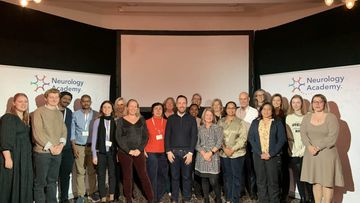With DMTs for everyone in sight, are MS services hitting a crisis point?
This year, we reach an exciting landmark for multiple sclerosis (MS) - there could soon be a disease-modifying treatment (DMT) available for everyone living with MS. DMTs are able to slow or even halt the progression of someones’ MS, rather than treating their symptoms only, meaning they have the capacity to give a huge amount of hope, and the promise of greater quality of life for longer.
However, whilst this is incredible news, particularly for those living with secondary or primary progressive MS, who until now have lived with managing rather than treating their MS, there is a flip side. Our already overburdened NHS is simply not equipped to treat the sheer volume of patients they need to now take in.
Public Health England recently published new statistics for MS, sharing that there are around 105,800 people living with MS in England alone, and that an additional 4,950 people are diagnosed with the condition every year (PHE 2020). The MS Society highlight that, put that in context, that means that across the UK around 14 people are diagnosed with MS each and every day (MSS 2018). And very soon, every one of them could potentially elect to start a DMT, in addition to those already accessing DMTs. Those eagerly awaiting access to Ocrelizumab (approved by NICE for treatment of primary progressive MS (PPMS) in June 2019) and Siponimod (recommended for licensing for active secondary progressive MS (SPMS) in November 2019 with NICE appraisal results expected in May this year) will expect their local services to be able to prescribe them the drugs which they are eligible for.
A recent study estimating the prevalence of SPMS across the USA and Europe found that the UK had the highest estimates at 57.8 per 100,000 people (Khurana, 2018). With Public Health England’s new data putting the total MS population at 109 per 100,000, the burden to MS services could almost double should Siponimod be approved for use.
We know that services are already stretched across the NHS; two years ago Rachel Dorsey-Campbell presented her work on a DMT cost calculator tool whose data showed that, with over 20,000 patients on a DMT, the cost in blood tests alone is in excess of £350,000 each year. In order to safely administer DMTs and effectively monitor those receiving them, she estimated that the cost in staff time alone could amount to a currently uncommissioned £1.2 million.
Fig 1: Academic poster outlining the findings from Rachel Dorsey-Campbell’s DMT cost calculator tool
Professor Gavin Giovannoni makes an argument for looking at MS as one disease, rather than segmenting it into three - relapsing-remitting, primary progressive, and secondary progressive. In his December 2019 post on the Barts-MS blog, he highlighted the difficulties that the various labels cause in terms of ensuring people with MS have access to the right disease-modifying therapies at the right time and noted the difficulties in eligibility criteria to ensure people can access the best treatment for them at the time. Having these obstacles in the system undoubtedly means that not everyone can access the DMT that would best suit them, which of course is unacceptable. However, it also stems the impending tidalwave of patients rightly vying for the treatment they need, and perhaps buys enough time to think laterally about the situation and put solutions in place before the problems escalate.
In August last year, speaking at the second event in the ‘Raising the Bar’ programme, Professor Giovannoni told a room of 120 healthcare professionals with a specialism in MS that we were in the midst of a ‘perfect storm’ regarding MS services, highlighting some of the core challenges facing the MS community: the increasing prevalence of MS, the largely hidden cost of safely delivering DMTs, the increasing numbers of people seeking to access them and the influx of new patients expected should Siponimod be approved.
Around the country, there are already examples of how different MS teams are delivering DMTs, improving early access, administration and monitoring practice, and this kind of service analysis and improvement has dominated our MasterClass projects of late (filed under ‘medication’). Amongst other condition areas, disease-modifying therapies are becoming a more common treatment option, such as within rheumatology (known as DMARDs) whilst, research continues to find DMTs for Parkinson’s, Alzheimer’s and other forms of dementia. It is clear that the changing face of treatment options will require new ways of working, and of delivering these services in the future.
The national programme, ‘Raising the Bar for MS’ has been established by healthcare professionals ‘to improve MS services for all people with MS and their families, and to make delivering these services for all involved a rich and rewarding experience.’ This includes focusing on how we can work differently to achieve this goal, with Professor Jeremy Hobart noting at an early event for ‘Raising the Bar’, ‘it is deeply challenging, but we have to radically change what we do.’ With the drastically increasing patient numbers needing equitable access to DMTs, this need to ‘radically change’ has never been more essential.
Related articles
Encouraging excellence, developing leaders, inspiring change
MS Academy was established five years ago and in that time has accomplished a huge amount. The six different levels of specialist MS training are dedicated to case-based learning and practical application of cutting edge research. Home to national programme Raising the Bar and the fantastic workstream content it is producing, this is an exciting Academy to belong to.


